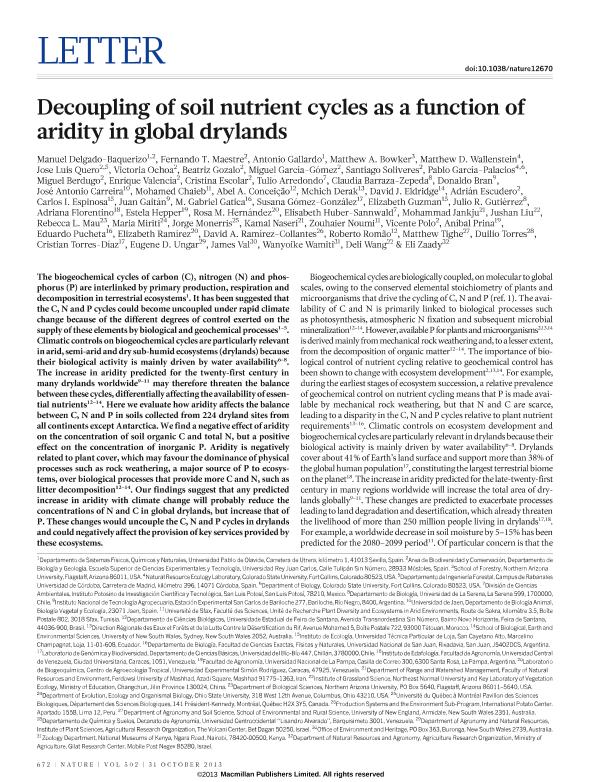Artículo
Decoupling of soil nutrients cycles as a function of aridity in global drylands
Delgado Baquerizo, Manuel; Maestre, Fernando T.; Gallardo, Antonio; Bowker, Matthew A.; Wallenstein, Matthew D.; Bran, Donaldo Eduardo; Gatica, Mario Gabriel ; Hepper, Estela Noemí; Prina, Anibal Oscar; Pucheta, Eduardo Raúl; Huber Sannwald, Elisabeth; Jankju, Mohammad; Liu, Jushan; Mau, Rebecca L.; Miriti, Maria; Monerris, Jorge; Naseri, Kamal; Noumi, Zouhaier; Polo, Vicente; Ramírez Collantes, David A.; Romão, Roberto; Tighe, Matthew; Torres, Duilio; Torres Díaz, Cristian; Ungar, Eugene D.; Val, James; Wamiti, Wanyoike; Wang, Deli; Zaady, Eli
; Hepper, Estela Noemí; Prina, Anibal Oscar; Pucheta, Eduardo Raúl; Huber Sannwald, Elisabeth; Jankju, Mohammad; Liu, Jushan; Mau, Rebecca L.; Miriti, Maria; Monerris, Jorge; Naseri, Kamal; Noumi, Zouhaier; Polo, Vicente; Ramírez Collantes, David A.; Romão, Roberto; Tighe, Matthew; Torres, Duilio; Torres Díaz, Cristian; Ungar, Eugene D.; Val, James; Wamiti, Wanyoike; Wang, Deli; Zaady, Eli
 ; Hepper, Estela Noemí; Prina, Anibal Oscar; Pucheta, Eduardo Raúl; Huber Sannwald, Elisabeth; Jankju, Mohammad; Liu, Jushan; Mau, Rebecca L.; Miriti, Maria; Monerris, Jorge; Naseri, Kamal; Noumi, Zouhaier; Polo, Vicente; Ramírez Collantes, David A.; Romão, Roberto; Tighe, Matthew; Torres, Duilio; Torres Díaz, Cristian; Ungar, Eugene D.; Val, James; Wamiti, Wanyoike; Wang, Deli; Zaady, Eli
; Hepper, Estela Noemí; Prina, Anibal Oscar; Pucheta, Eduardo Raúl; Huber Sannwald, Elisabeth; Jankju, Mohammad; Liu, Jushan; Mau, Rebecca L.; Miriti, Maria; Monerris, Jorge; Naseri, Kamal; Noumi, Zouhaier; Polo, Vicente; Ramírez Collantes, David A.; Romão, Roberto; Tighe, Matthew; Torres, Duilio; Torres Díaz, Cristian; Ungar, Eugene D.; Val, James; Wamiti, Wanyoike; Wang, Deli; Zaady, Eli
Fecha de publicación:
10/2013
Editorial:
Nature Publishing Group
Revista:
Nature
ISSN:
0028-0836
Idioma:
Inglés
Tipo de recurso:
Artículo publicado
Clasificación temática:
Resumen
The biogeochemical cycles of carbon (C), nitrogen (N) and phosphorus (P) are interlinked by primary production, respiration and decomposition in terrestrial ecosystems. It has been suggested that the C, N and P cycles could become uncoupled under rapid climate change because of the different degrees of control exerted on the supply of these elements by biological and geochemical processes. Climatic controls on biogeochemical cycles are particularly relevant in arid, semi-arid and dry sub-humid ecosystems (drylands) because their biological activity is mainly driven by water availability. The increase in aridity predicted for the twenty-first century in many drylands worldwide may therefore threaten the balance between these cycles, differentially affecting the availability of essential nutrients. Here we evaluate how aridity affects the balance between C, N and P in soils collected from 224 dryland sites from all continents except Antarctica. Wefind a negative effect of aridity on the concentration of soil organic C and total N, but a positive effect on the concentration of inorganic P. Aridity is negatively related to plant cover, which may favour the dominance of physical processes such as rock weathering, a major source of P to ecosystems, over biological processes that provide more C and N, such as litter decomposition1. Our findings suggest that any predicted increase in aridity with climate change will probably reduce the concentrations of N and C in global drylands, but increase that of P. These changes would uncouple the C, N and P cycles in drylands and could negatively affect the provision of key services provided by these ecosystems.
Palabras clave:
Drylands
,
Earth Sciences
,
Biogeochemistry
,
Carbon, Nitrogen And Phosphorus
Archivos asociados
Licencia
Identificadores
Colecciones
Articulos(SEDE CENTRAL)
Articulos de SEDE CENTRAL
Articulos de SEDE CENTRAL
Citación
Delgado Baquerizo, Manuel; Maestre, Fernando T.; Gallardo, Antonio; Bowker, Matthew A.; Wallenstein, Matthew D.; et al.; Decoupling of soil nutrients cycles as a function of aridity in global drylands; Nature Publishing Group; Nature; 502; 7473; 10-2013; 672-676
Compartir
Altmétricas



